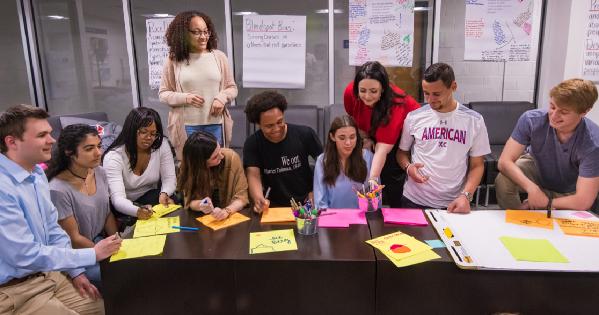Finding Their Voices Through Complex Problems

Kamelle Ruano remembers vividly her first steps inside a classroom at American University.
Ruano walked into a section of the complex problems course—Fight Club: US War and Peace—as a timid, nervous first-year student. But her experience there changed her trajectory.
“I was a student who did not speak a word my first month of college,” Ruano said. “I was so scared of saying the wrong answer. But after an office meeting with the professor, I saw that it was okay to ask questions and spur discussion. I started becoming more vocal and started offering my own opinions. And it changed the way I think analytically and critically.”
Facilitating difficult conversations and moving students into an inquiry-based model guided university leaders when developing AU’s new core curriculum, which deviates from the common subject-based core model. Courses like complex problems and American University Experience help integrate first-year students into the university setting while teaching them how to navigate college, empower their curiosity, and foster nimble thinking in a quickly changing world.
Faculty director Adam Tamashasky relishes the opportunity to work with first-year students.
“When I have anyone whose first college class is with me, I’m awash with privilege,” said Tamashasky, who teaches the West’s Problem with Evil. “These students are excited, freaked out, sort of like an exposed nerve. To be a part of their growth and helping them integrate into AU has been the best experience.”
SIS professor Tazreena Sajjad also embraces the connection with new students. Sajjad’s course focuses on refugees and forcible displacement. Because the sections have fewer than 20 students, Sajjad said the class feels like a community.
“These are difficult conversations that we have, to solve a problem,” Sajjad said. “We are just beginning to try and understand what some of these issues, concepts, assumptions and prejudices are and a small audience is helpful.”
Ruano was so impacted by her complex problems experience that she has been a peer leader in the program for five semesters. Peer leaders are teaching assistants who connect with students and facilitate classroom conversations.
A communication, legal institutions, economics, and government senior, Ruano believes complex problems enhances the first-year experience and pushes students to have respectful and open dialogue as they discuss issues facing the globe. Students engage through readings, films, field trips, and important conversations. With more than 140 topics, complex problems offers a wide swath of opportunities to think through philosophy, current, events, pop culture, and politics
“I think powerful questions are exactly at the core of what we were trying to figure out, and complex problems allows us to work out how we think about an issue and how we should approach solving them,” Ruano said. “It can be very profound.”
Peri Munter, a recent graduate and double major in philosophy and legal studies in CAS and SPA, felt a similar impact in her complex problems course: Justice, Morality, and the Law. She developed a deep interest in philosophy through the course and changed her major because of it. She also bonded with the professor Michelle Engert and later worked on research on Engert’s book manuscript.
“Ethics felt super interesting, and I wondered what people did in philosophy,” Munter said. “She was one of my favorite professors, and the class made a difference for me and my path.”